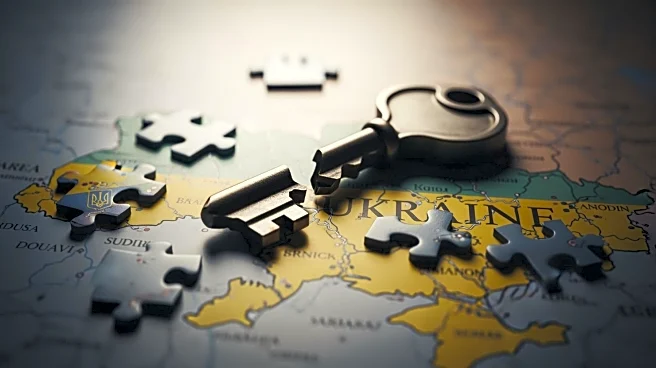What's Happening?
In eastern Ukraine, the ongoing conflict has led to a significant humanitarian crisis, with over 4.5 million people officially registered as internally displaced. These individuals often arrive at shelters
and transit hubs with minimal belongings, seeking refuge in temporary spaces such as disused dorms, tents, and abandoned basements. Volunteers have been instrumental in setting up field kitchens and creating makeshift privacy curtains from old sheets. The displaced population includes families who once lived stable lives but now face uncertainty, as well as children and elderly evacuees who endure long waits for news of resettlement. The conflict has resulted in damage or destruction to more than 13% of Ukrainian homes, exacerbating the strain on relief systems already challenged by ongoing Russian bombardment.
Why It's Important?
The displacement crisis in Ukraine underscores the severe impact of prolonged conflict on civilian populations. The influx of internally displaced persons places immense pressure on humanitarian resources and infrastructure, highlighting the urgent need for international support and intervention. The situation affects not only the immediate well-being of those displaced but also poses long-term challenges for Ukraine's social and economic stability. As the conflict continues, the ability of relief systems to accommodate and support the growing number of displaced individuals becomes increasingly critical, with potential implications for regional security and international relations.
What's Next?
The ongoing conflict suggests that the number of displaced individuals may continue to rise, necessitating further expansion of relief efforts and international aid. Humanitarian organizations and governments may need to increase their support to ensure adequate shelter, food, and medical care for those affected. Additionally, diplomatic efforts to resolve the conflict could play a crucial role in stabilizing the region and reducing the displacement crisis. Monitoring the situation and adapting strategies to address the evolving needs of the displaced population will be essential for mitigating the humanitarian impact.
Beyond the Headlines
The displacement crisis in Ukraine raises broader ethical and legal questions about the protection of civilians in conflict zones and the responsibilities of international actors. The situation highlights the need for comprehensive policies that address the rights and needs of displaced populations, including access to education, healthcare, and employment opportunities. Long-term solutions may require collaborative efforts between governments, NGOs, and international organizations to rebuild communities and support the integration of displaced individuals into society.









